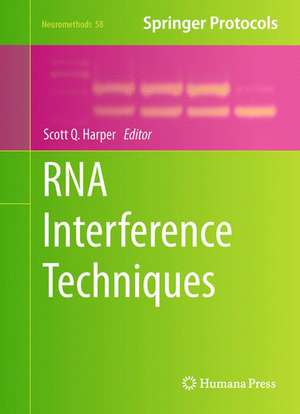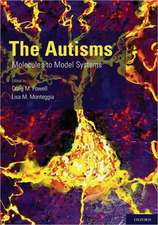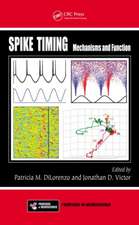RNA Interference Techniques: Neuromethods, cartea 58
Editat de Scott Q. Harperen Limba Engleză Hardback – 16 mai 2011
Cutting-edge and concise, RNA Interference Techniques promises to support the vital research in the field of RNAi and miRNAs, ever-continuing to grow rapidly and gain increasing importance in basic and translational biology.
| Toate formatele și edițiile | Preț | Express |
|---|---|---|
| Paperback (1) | 772.93 lei 43-57 zile | |
| Humana Press Inc. – 23 aug 2016 | 772.93 lei 43-57 zile | |
| Hardback (1) | 644.95 lei 43-57 zile | |
| Humana Press Inc. – 16 mai 2011 | 644.95 lei 43-57 zile |
Din seria Neuromethods
- 5%
 Preț: 347.57 lei
Preț: 347.57 lei - 15%
 Preț: 659.53 lei
Preț: 659.53 lei - 15%
 Preț: 665.08 lei
Preț: 665.08 lei - 18%
 Preț: 986.63 lei
Preț: 986.63 lei - 24%
 Preț: 852.89 lei
Preț: 852.89 lei - 18%
 Preț: 953.03 lei
Preț: 953.03 lei - 18%
 Preț: 955.25 lei
Preț: 955.25 lei - 20%
 Preț: 1129.36 lei
Preț: 1129.36 lei - 20%
 Preț: 1252.04 lei
Preț: 1252.04 lei - 18%
 Preț: 1291.45 lei
Preț: 1291.45 lei - 15%
 Preț: 652.31 lei
Preț: 652.31 lei - 18%
 Preț: 955.70 lei
Preț: 955.70 lei - 23%
 Preț: 705.39 lei
Preț: 705.39 lei - 18%
 Preț: 973.38 lei
Preț: 973.38 lei - 18%
 Preț: 964.86 lei
Preț: 964.86 lei - 18%
 Preț: 968.03 lei
Preț: 968.03 lei - 15%
 Preț: 662.95 lei
Preț: 662.95 lei - 15%
 Preț: 646.43 lei
Preț: 646.43 lei - 15%
 Preț: 649.71 lei
Preț: 649.71 lei -
 Preț: 395.29 lei
Preț: 395.29 lei - 19%
 Preț: 580.67 lei
Preț: 580.67 lei - 19%
 Preț: 584.12 lei
Preț: 584.12 lei - 19%
 Preț: 566.41 lei
Preț: 566.41 lei - 15%
 Preț: 652.17 lei
Preț: 652.17 lei - 15%
 Preț: 655.13 lei
Preț: 655.13 lei - 18%
 Preț: 959.36 lei
Preț: 959.36 lei - 15%
 Preț: 652.49 lei
Preț: 652.49 lei - 15%
 Preț: 649.54 lei
Preț: 649.54 lei - 15%
 Preț: 649.87 lei
Preț: 649.87 lei - 15%
 Preț: 650.19 lei
Preț: 650.19 lei - 15%
 Preț: 648.42 lei
Preț: 648.42 lei - 18%
 Preț: 1039.22 lei
Preț: 1039.22 lei - 18%
 Preț: 963.15 lei
Preț: 963.15 lei
Preț: 644.95 lei
Preț vechi: 758.77 lei
-15% Nou
Puncte Express: 967
Preț estimativ în valută:
123.42€ • 128.08$ • 103.16£
123.42€ • 128.08$ • 103.16£
Carte tipărită la comandă
Livrare economică 17-31 martie
Preluare comenzi: 021 569.72.76
Specificații
ISBN-13: 9781617791130
ISBN-10: 161779113X
Pagini: 165
Ilustrații: XII, 173 p.
Dimensiuni: 178 x 254 x 15 mm
Greutate: 0.54 kg
Ediția:2011
Editura: Humana Press Inc.
Colecția Humana
Seria Neuromethods
Locul publicării:Totowa, NJ, United States
ISBN-10: 161779113X
Pagini: 165
Ilustrații: XII, 173 p.
Dimensiuni: 178 x 254 x 15 mm
Greutate: 0.54 kg
Ediția:2011
Editura: Humana Press Inc.
Colecția Humana
Seria Neuromethods
Locul publicării:Totowa, NJ, United States
Public țintă
Professional/practitionerCuprins
Designing Hairpin-Based RNAi Shuttles.- Rapid Cloning and Validation of MicroRNA Shuttle Vectors: A Practical Guide.- The Use of Small Non-Coding RNAs to Silence Transcription in Human Cells.- Delivery Strategies for RNAi to the Nervous System.- Cloning Small RNAs.- Profiling the miRNome: Detecting Global miRNA Expression Levels with DNA Microarrays.- High Throughput Profiling of Mature MicroRNA by Real-Time PCR.- In Situ Detection of MicroRNAs in Paraffin Embedded, Formalin Fixed Tissues: Different Methodologies and Co-Localization with Possible Targets.- Tracing of siRNAs Inside Cells by FRET Imaging.- Application of RIP-Chip for the Identification of miRNA Targets.
Textul de pe ultima copertă
Non-coding, inhibitory microRNAs have emerged as important modulators of cellular gene expression, through a process called RNA interference (RNAi). To date, hundreds of conserved and species-specific microRNAs have been identified in organisms ranging from single-celled algae to humans. Many of these tiny RNAs are now known to play fundamental roles in developmental biology and disease pathogenesis. In addition, RNAi has emerged as a technology useful for manipulating gene expression. In RNA Interference Techniques, expert researchers present detailed methods for designing and delivering artificial inhibitory RNAs to neural tissue and for detecting or cloning endogenous microRNAs, all in order to aid investigators’ attempts to ask basic biological questions or develop therapeutics for dominant neurogenetic disorders, cancer, or viral infection. As a volume in the successful Neuromethods series, the chapters provide authoritative accounts of the most commonly used approaches in the field today.
Cutting-edge and concise, RNA Interference Techniques promises to support the vital research in the field of RNAi and miRNAs, ever-continuing to grow rapidly and gain increasing importance in basic and translational biology.
Cutting-edge and concise, RNA Interference Techniques promises to support the vital research in the field of RNAi and miRNAs, ever-continuing to grow rapidly and gain increasing importance in basic and translational biology.
Caracteristici
Spotlights a rapidly growing field with increasing importance in basic and translational biology Contains key protocols and clear cut guidance Supports the development of therapeutics for dominant genetic disorders, cancer, or viral infection Includes supplementary material: sn.pub/extras














